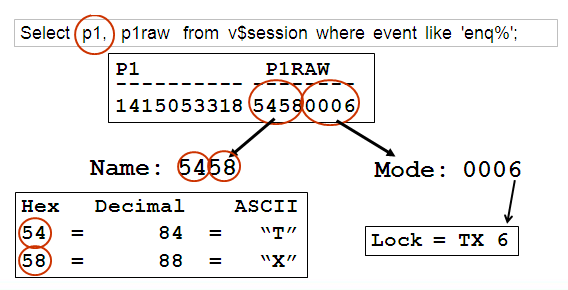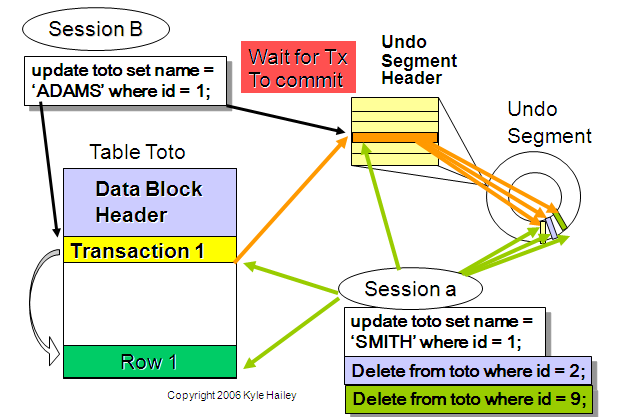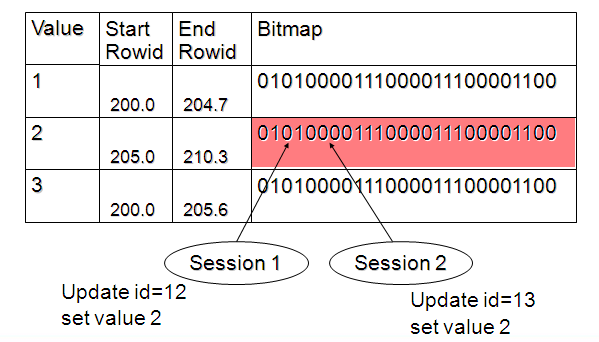Oracle:Enqueues
Contents
- 1 Oracle: Enqueues
- 1.1 Part I: Intro
- 1.2 Part II: User Locks
- 1.2.1 How a TX lock happens
- 1.2.2 enq: TX - row lock contention , mode 6
- 1.2.3 enq: TX - row lock contention , mode 4
- 1.2.4 enq: TX - row lock contention, mode 4, unique index
- 1.2.5 enq: TX - row lock contention, mode 4, foreign key
- 1.2.6 enq: TX - row lock contention, mode 4, bitmap indexes
- 1.2.7 Three types of TX row contention mode 4 as seen from ASH data:
- 1.2.8 enq: TX - allocate ITL entry
- 1.2.9 enq: TX - index contention
- 1.2.10 enq: TX - contention
- 1.2.11 enq: TM - contention
- 1.2.12 enq: UL - contention
- 1.3 Part III: Internal locks
- 1.4 Part IV: Old Methods
- 1.5 Other Resources
Oracle: Enqueues
Part I: Intro
Information we need to solve locking issues :
1. Waiter
2. Blocker
3. Lock Type
- type
- mode
4. Object blocking on
5. Blocking SQL is Missing (Possibly with log miner)
ASH data
- Waiter
- SESSION_ID
- SESSION_SERIAL#
- USER_ID
- Object
- CURRENT_OBJ#
- CURRENT_FILE#
- CURRENT_BLOCK#
- SQL Waiting
- SQL_ID
- Blocker (as of 10gR2)
- BLOCKING_SESSION
- BLOCKING_SESSION_STATUS
- BLOCKING_SESSION_SERIAL#
- Lock Type and Mode
- Event = Type (name)
- P1 = Type | Mode
Lock Mode and Name
- Select parameter1 from v$event_name where name=‘enqueue’;
- Parameter1
- ----------
- Name|mode
- Select p1, p1raw from v$session where event like 'enq%';
- P1 P1RAW
- ---------- --------
- 1415053318 54580006
- Type = 5458
- Mode = 0006
- Hex Decimal ASCII
- 54 = 84 = "T"
- 58 = 88 = "X"
- Lock = TX 6
- Wrapping this information up in one query we get:
- SELECT
- chr(bitand(p1,-16777216)/16777215)||
- chr(bitand(p1, 16711680)/65535) Type,
- mod(p1,16) lmode
- from v$active_session_history
- where event like 'enq%';
- SELECT
| TY | LMODE |
| HW | 6 |
| RO | 6 |
| JS | 6 |
- Notice that the query uses "v$active_session_history" but could also be used on v$session starting in 10g, or v$session_wait since version 7.
- 9i (and below)
- One Wait : 'enqueue'
- had to decode name and mode
- 10g
- 208 enqueue waits
- Specific to each type of enqueue
- No longer need to decode name
- but the mode can still be important to decode
- For example, what was called an "enqueue" wait before 10g is now broken out like
| enq: HW - contention | Configuration |
| enq: SQ - contention | Configuration |
| enq: SS - contention | Configuration |
| enq: ST - contention | Configuration |
| enq: TM - contention | Application |
| enq: TW - contention | Administrative |
| enq: TX - allocate ITL entry | Configuration |
| enq: TX - index contention | Concurrency |
| enq: TX - row lock contention | Application |
| enq: TX – contention | Application |
Lock Modes
# Type Name
--- ------- ---------------------------
1 Null Null
2 SS Sub share
3 SX Sub exclusive
4 S Share
5 SSX Share/sub exclusive
6 X Exclusive
In our analysis of locks and waits we are going to talk mainly about share locks, mode 4 and exclusive locks, mode 6.
Since version 10g wait event names now have the name of the lock there is no longer a need to translate the name and we can just concentrate on translating the mode:
select
event,
p1,
mod(p1,16) as "mode"
from v$active_session_history
where event like 'enq:%‘;
EVENT P1 mode ----------------------------- ---------- ---- enq: TX - allocate ITL entry 1415053316 4 enq: TX - row lock contention 1415053318 6 enq: TX - row lock contention 1415053316 4
Mining ASH
TX locks
/* col file# for 99999 col block# for 999999 col obj for a18 col type for a9 col lm for 99 col bsid for 9999 */
select count(*) cnt,
session_id sid,
substr(event,1,30) event,
mod(p1,16) as lm,
sql_id,
CURRENT_OBJ# || ' ' || object_name obj
, o.object_type type
, CURRENT_FILE# file#
, CURRENT_BLOCK# block#
, blocking_session bsid
from v$active_session_history ash,
all_objects o
where
event like 'enq: T%'
and o.object_id (+)= ash.current_obj#
group by event,session_id,p1,sql_ID,CURRENT_OBJ#,OBJECT_NAME,OBJECT_TYPE,CURRENT_FILE#, CURRENT_BLOCK#, BLOCKING_SESSION
order by count(*)
/
cnt SID EVENT LM SQL_ID OBJ TYPE F# BLOCK# BSID --- --- ------------------- -- ------------- --- ----- -- ------- ---- 307 127 enq: TX - row lock 6 6yzrt1vdqrfn1 FOO TABLE 6 10541 148 307 128 enq: TX - row lock 6 6yzrt1vdqrfn1 FOO TABLE 6 10541 148 307 125 enq: TX - row lock 6 6yzrt1vdqrfn1 FOO TABLE 6 10541 148 307 126 enq: TX - row lock 6 6yzrt1vdqrfn1 FOO TABLE 6 10541 148
TXI, like above but get index type as well, if an index is involved in the lock
/*
col file# for 99999
col block# for 999999
col obj for a18
col type for a15
*/
select substr(event,1,30) event, sql_id,
CURRENT_OBJ# || ' ' || object_name obj
, o.object_type type
, CURRENT_FILE# file#
, CURRENT_BLOCK# block#
from v$active_session_history ash,
( select a.object_name,
a.object_id,
decode(a.object_type,'INDEX',i.index_type||' '||'INDEX',a.object_type) object_type
from all_objects a, all_indexes i where
a.owner=i.owner(+) and a.object_name=i.index_name(+) ) o
where
event like 'enq: TX%'
and o.object_id (+)= ash.current_obj#
order by sample_time
/
Part II: User Locks
TX - Transaction Lock
Mode 6: Modifying same row
Mode 4: several reasons
TM - Table Modification
Mode 4: Unindexed Foreign Key
UL - User Lock
How a TX lock happens
- TX = Transaction = Wait on UNDO
- Mode 6 (exclusive)
- modification of a row lock
- Mode 6 (exclusive)
- Mode 4 (share)
- Index block spilt
- Unique Index Key enforcement
- Foreign key enforcement
- ITL space waits
- Bitmap chunk conflicts
- Alter tablespace … read only;
- Free Lists slot waits
- Possible with two phase commit
- TX mode 6 is straight forward, just two sessions trying to change the same data
- TX mode 4 has many reasons and historically has been hard to diagnose, but now in 10g Oracle had broken down TX locks in to these sub types:
- enq: TX - row lock contention
- o pk or unique index violation
- o fk violation
- o bitmap chunk wait
- o others ?
- enq: TX - allocate ITL entry
- o Wait on an ITL slot
- enq: TX - index contention
- o Index block split
- enq: TX - contention
- o Wait for a data file extension
- o Alter tbs read only
- o others?
- (NOTE: that "enq: TX - row lock contention" can happen in both mode 6, the typical case, or mode 4 which is shown above)
enq: TX - row lock contention , mode 6
| User1 | User 2 |
| delete from toto where id =1; | |
| delete from toto where id=1;
--> wait till Use 1 commits or rollbacks |
enq: TX - row lock contention , mode 4
- Mode 4, happens for 3 reasons
- 1. Unique key contention
- 2. Foreign Key contention
- 3. Bitmap index contention
- (others?)
enq: TX - row lock contention, mode 4, unique index
| user 1 | user 2 |
| create table p (n number);
create unique index p_i on p(n); |
|
| insert into p values(2); | |
| insert into p values (2); |
enq: TX - row lock contention, mode 4, foreign key
| user 1 | user 2 |
create table parent (
create table child (
|
|
| insert into p values(2); | |
| insert into child values (2,88); |
enq: TX - row lock contention, mode 4, bitmap indexes
- Bitmaps are compressed
- Changes to the same bitmap cause locks
| user 1 | user 2 |
create table t1 (
|
|
| update t1 set n1 = 2 where n2 = 12; | |
| update t1 set n1 = 2 where n2 = 13; |
- Different rows but same key value.
Three types of TX row contention mode 4 as seen from ASH data:
Unique Index ST EVENT SID LM P2 P3 OBJ OTYPE FN BLOCKN SQL_ID BSID ----- ---------------------- --- --- ------ ---- ----- ----- --- ------ -------------- ---- 10:39 enq: TX - row lock c 141 4 655406 6672 -1 0 0 bjvx94vnxtxgv 158 10:39 enq: TX - row lock c 141 4 655406 6672 -1 0 0 bjvx94vnxtxgv 158 10:39 enq: TX - row lock c 141 4 655406 6672 -1 0 0 bjvx94vnxtxgv 158 10:39 enq: TX - row lock c 141 4 655406 6672 -1 0 0 bjvx94vnxtxgv 158
Foreign Key (10.2.0.3) ST EVENT SID LM P2 P3 OBJ OTYPE FN BLOCKN SQL_ID BSID ----- ---------------------- --- --- ------ ---- ----- ----- --- ------ -------------- ---- 10:41 enq: TX - row lock c 144 4 179681 7074 CHILD TABLE 1 60954 ahm7c9rupbz9r 1 10:41 enq: TX - row lock c 144 4 179681 7074 CHILD TABLE 1 60954 ahm7c9rupbz9r 1 10:41 enq: TX - row lock c 144 4 179681 7074 CHILD TABLE 1 60954 ahm7c9rupbz9r 1
Bitmap Index ST EVENT SID LM P2 P3 OBJ OTYPE FN BLOCKN SQL_ID BSID ----- ---------------------- --- --- ------ ---- ----- ----- --- ------ -------------- ---- 10:41 enq: TX - row lock c 143 4 966081 4598 I1 INDEX 0 0 azav296xxqcjx 144 10:41 enq: TX - row lock c 143 4 966081 4598 I1 INDEX 0 0 azav296xxqcjx 144 10:41 enq: TX - row lock c 143 4 966081 4598 I1 INDEX 0 0 azav296xxqcjx 144 10:41 enq: TX - row lock c 143 4 966081 4598 I1 INDEX 0 0 azav296xxqcjx 144
enq: TX - allocate ITL entry
- create table itl (
- id number,
- data varchar2(20)
- )
- pctfree 0
- initrans 1
- insert into itl select rownum,'a' from all_objects
- where rownum < 2000;
- commit;
- session 1: update itl set data=data where id=1;
- session 2: update itl set data=data where id=2;
- session 3: update itl set data=data where id=3;
- session 4: update itl set data=data where id=4;
- session 5: update itl set data=data where id=5;
enq: TX - index contention
Seems to be caused by index block splits. see http://sites.google.com/site/embtdbo/wait-event-documentation/oracle-enq-tx---index-contention for some ideas on how to generate this wait to look at it more
enq: TX - contention
- "enq: TX - contention" seems to be the trash bucket for all other TX contention issues and seems to be used when sessions are waiting on other sessions who are blocked some issues:
- Example
- Data File Extension – waiter waiting for another session to extend file
- Index Block Split – waiter waiting for another session to split the block
- Possibilities
- Setting Table space read only
- Session 1 – start transaction, don’t commit
- Session 2 – alter tablespace read only
- Free Lists
- Non-ASSM
- Sessions freeing block
- If no txs free lists available (min 16, grow up depending on block size) , pick one and wait TX 4
- 2PC – two phase commit
- First does a prepare the commit
- Any read or write access in the intervening time waits TX 4
enq: TM - contention
TX locks have a corresponding TM lock TM locks the structure from change
| LOCK | Parmeter1 | Parmeter2(ID1) | Parameter3(ID2) |
| enq: TM | mode | object # | table/partition |
(1) To many truncate requests
(2) Unindexed FKs
(3) Bitmap indexes on the table (low possibility; but possibility nonetheless)
- Anup Nanda
(4) direct mode insert, or insert /*+ append */ which will take TM enqueue in exclusive mode. If the transaction doesn't commit, you could see a whole bunch of sessions stack up behind it. - Mark Bobak
enq: UL - contention
Part III: Internal locks
.
enq: CF - contention
see bug 7516169 - SLOW INSERT TO PARENT TABLE WHEN CHILD IS REFERENCE PARTITIONED base bug 7147650
Mark Bobak: Event 10359, set to level 1, stops update of the control file with invalidation redo is stopped. See MetaLink Doc ID 1058851.6 for more details. (And yes, Steve's website also discusses it.) . from http://www.saptechies.com/faq-oracle-enqueues/ :
- TYPE = CF
- CF enqueues are control file enqueues, which occur during parallel access to the control file. Actions that make it necessary to access the control file can be for example, BEGIN BACKUP, redolog archiving by an ARCH process, or a logfile switch by the LGWR process. If a CF enqueue is requested within a period of 15 minutes without success, ORA-00600 [2103] occurs, and the Oracle instance may terminate (see Note 658744)..
- In "checkpoint not complete" situations (Note 79341), the LGWR process may wait for a long time for the CF enqueue. This is a follow-on problem. The "checkpoint not complete" situations that cause this problem must be corrected (Note 793113).
- See Note 658744, which contains possible causes and solutions for CF enqueues and the ORA-00600 [2103] that are triggered by it.
- CF enqueue waits may also occur during an Archiver stuck (Note 391) since in such cases the ARCH process may hold the CF enqueue for a long time. In this case, CF enqueue are only a follow-on problem; after you solve the Archiver stuck situation, the enqueue waits will also disappear
enq: CI - Cross Instance
Indicative of high incremental checkpointing and waiting on blocks being checkpinted - increase fast_start_mttr_target
enq: HW - contention
. High Water- contention on moving up the high water mark - move object to ASSM or add freelists . .
enq: KO - fast object checkpoint
. used by PQO to clear out any relavent information from the cache before doing a direct read on the objects . .
enq: RO - fast object reuse
reusable object- clearing cache for object drop/reuse, use gtt if possible, tune DBWR
enq: SQ - contention
. . . .
enq: ST - contention
. . . .
.
Part IV: Old Methods
.
- Statspack
- Top 5 Timed Events
Avg %Total
wait Call
Event Waits Time (s) (ms) Time
-------------------------- ------------ ----------- ------ ------
Enqueue 42 126 3000 96.5
CPU time 4 2.8
db file sequential read 165 1 4 .4
control file sequential read 214 0 1 .1
log file switch completion 2 0 40 .1
- Statspack is INSUFFICIENT, missing
- Who is waiting
- Who is blocking
- What kind of lock (type and mode)
- What they are blocked on (object)
- Statspack 10g
5 Timed Events Avg %Total
wait Call
Event Waits Time (s) (ms) Time
----------------------------- ------ -------- ------ ------
enq: TX - row lock contention 42 126 3000 96.5
CPU time 4 2.8
db file sequential read 165 1 4 .4
control file sequential read 214 0 1 .1
log file switch completion 2 0 40 .1
- 10g better because statspack now tells lock name, still missing
- Who is waiting
- Who is blocking
- What kind of lock
- What they are blocked on


